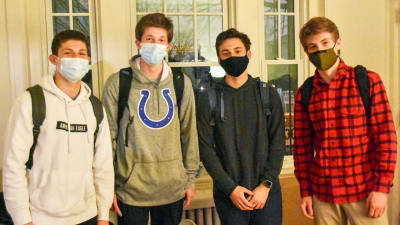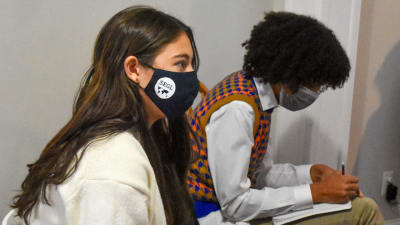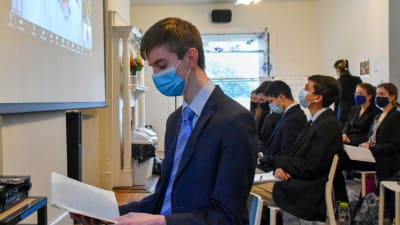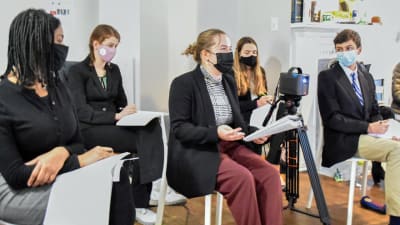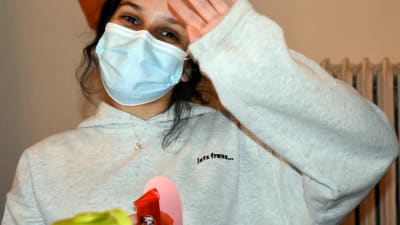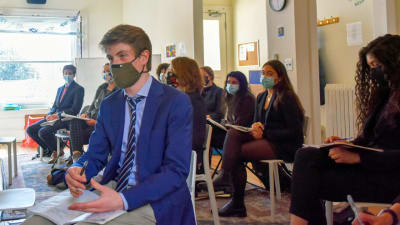MSNBC Anchor Ali Velshi; Rwanda experts highlight Week Three in DC
Every SEGL graduate remembers Ghosts of Rwanda Night. Viewing the powerful PBS Frontline documentary is an early and sober turning point each term; the session–and the case study that follows–inspire some of the semester’s best reflection.
What is the right response to mass atrocities? Should American leaders always prize American interests above all? Is it ever worth risking American lives to help halt tragedy abroad? How do we prevent human rights abuses from ever occurring?
Ghosts, and our second case study of the semester, poses these questions. The case includes meetings with two key players represented in the documentary and a virtual trip to the Rwandan Embassy. (We are learning about Rwanda as it again makes international headlines; this time for arresting and trying Paul Rusesabagina of Hotel Rwanda fame.)
On Monday morning, we met with Carl Wilkens, a former Adventist missionary who was the head of his church’s relief mission in Rwanda during the genocide. He was the only American to stay behind in 1994, and is most well-known for (among other acts) saving an entire orphanage from Interahamwe machetes. To SEGL graduates, he is a winner of our beloved “Golden Mug” award (2012), which our graduates give to the speaker who has made the biggest difference in their lives. (Carl is also an honorary SEGL teacher; three times he has co-led a group of our students to Rwanda.)
Wilkens joined us by videoconference. He is the founder of World Outside My Shoes, a genocide prevention NGO that travels the country speaking to schools, universities, and others. The students asked him a wide range of personal and political questions, and listened carefully as he addressed each one.
We also returned to our earlier case study on race in America, hosting Medgar Webster, Vice Chair of the DC Police Union. Webster, an African American man, career police officer, and lifelong DC resident, spoke thoughtfully about the role police unions ought to play in ensuring justice. He tackled challenging questions about defunding and abolishing the police, racial bias training, the value of civil disobedience, about being an African American man and a police officer, and about high profile cases like George Floyd and Breonna Taylor (his take on the latter sent students scurrying for more information).
And on Thursday, we welcomed MSNBC Anchor Ali Velshi for a lively, wide-ranging discussion that continued our media bias/literacy/ethics case study from earlier this spring. From a hotel room in Birmingham, Alabama (where he was preparing to cover racial inequity and progress; you can see one of his segments here), Velshi spent over 90 minutes fielding questions: his takes on getting hit by a rubber bullet (and later ridiculed by then-President Trump) while covering the aftermath of George Floyd’s death, right-wing media outlets, the power of social media, how best to “curate” the news for an audience, and more.
On Friday we heard from Ambassador George Moose, who was Assistant Secretary of State for African Affairs during the genocide. Moose (another Golden Mug honoree) helps students appreciate the bureaucratic hurdles that stymied attempts to intervene, as well as the reasons governments might choose against intervening in such conflicts. His diplomatic approach is also a useful contrast with Wilkens’ activist passion. Our world needs great leaders in both realms! (Moose was accompanied by Megan Chabalowski from the United States Institute of Peace, whose Board Moose vice-chairs.)
(Another longtime SEGL guest speaker featured in Ghosts is current UPS Vice President for Global Affairs Laura Lane. Although Lane no longer speaks publicly about her time in Rwanda, she gave a TED talk in 2015 that is very similar to the story she has told hundreds of SEGL graduates. You can view that talk here.)
The week also included a “Saturday Academy” (a weekly opportunity to explore DC and some of its key issues) focused on food security. After a short overview of DC’s food infrastructure (among other issues, we learned the term “food deserts”), we divided students into small groups and gave each a different budget (tied to the U.S. FDA’s weekly food plans) and real grocery store in which to shop (virtually, of course). We asked each group to shop for and then design a meal given its budget and grocery store. We then brought the groups together to share findings and lessons learned. The exercise was revealing and helped highlight some of the similarities and disparities between those at different income levels.
Next up: the Israeli-Palestinian Conflict (including our first in-person guest experts of the term) and another meeting with a Member of Congress!










